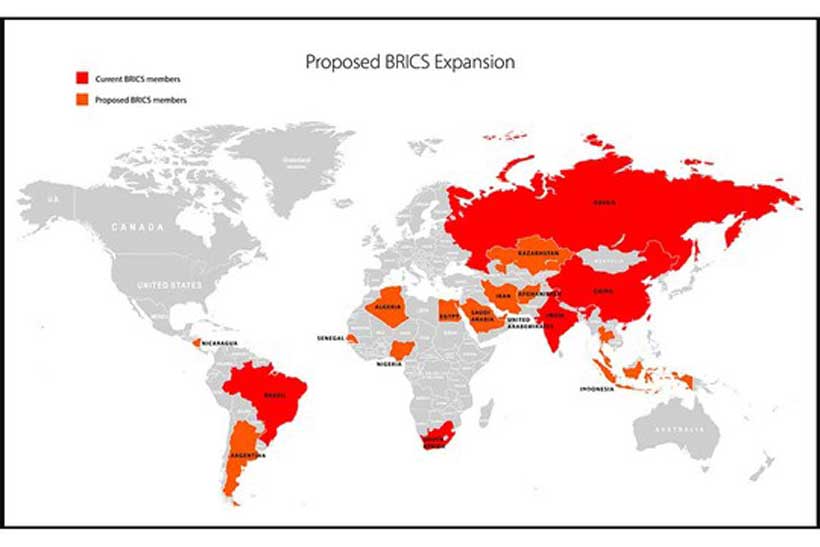With Saudi Arabia’s recent embrace into the BRICS fold, the landscape of global economics is witnessing a seismic shift. The Kingdom’s inclusion has triggered a domino effect, beckoning a host of developing nations to reconsider their allegiances and financial strategies. At the heart of this monumental shift is a collective yearning to distance from the dominating clutches of the US dollar, spurred by the crippling weight of dollar-denominated debt and a series of punitive measures from the West.
As of February 1st 2024, a staggering 34 nations have cast their lot, signaling their intent to join the BRICS consortium, as per reports from CNN. This revelation was made by none other than South Africa’s Foreign Minister Naledi Pandor, who, however, chose to keep the identities of these countries under wraps during a press briefing.
A New Financial Dawn Beckons
The allure of BRICS is unmistakable, especially for nations at the crossroads of economic development and financial autonomy. The coalition, spearheaded by powerhouses China and Russia, is not just expanding; it’s boldly redefining the very essence of global financial dynamics. The pivot away from the US dollar to a more inclusive reliance on local currencies is not merely a strategic move; it’s a clarion call for a multipolar world order, untethered from the West’s longstanding fiscal dominion. This paradigm shift, nuanced yet profound, promises to recalibrate the global economic compass, potentially dethroning the dollar from its pedestal of global reserve currency.
Amidst this backdrop, BRICS stands as a beacon for the Global South, challenging the hegemony of the G7 with a narrative of inclusivity and mutual development. It’s a narrative that resonates deeply with nations weary of the West’s economic dictates, yearning instead for a seat at the table of a more equitable global order. This burgeoning coalition, now enriched by the diverse economies of Iran, Saudi Arabia, the UAE, Ethiopia, and Egypt, among others, is scripting a new chapter in international relations, one where diplomacy and financial sovereignty intertwine.
Shifting Sands of Global Influence
At the helm of this transformative wave are China and Russia, nations that have long aspired to remodel the international order to reflect a more balanced distribution of power. The inclusion of new members into BRICS is not just a victory lap for these geopolitical titans; it’s a strategic maneuver to consolidate influence amidst escalating frictions with the West.
Russia, under the spotlight of global scrutiny following its actions in Ukraine, finds in BRICS a platform to counteract its diplomatic isolation, showcasing its pivotal role in shaping an alternative global narrative. As the chair of BRICS for the year, Russia’s stewardship marks a crucial phase in the bloc’s evolution, spotlighting its commitment to fostering a broad-based diplomatic engagement.
China’s ambitions, under the unwavering leadership of Xi Jinping, stretch even further, aiming to position itself as the architect of a new world order. Through BRICS, Beijing seeks to cement its influence, proposing an alternative to the West-centric global system. This push for a multipolar world is not just about expanding China’s diplomatic reach; it’s about offering a different vision of governance and international cooperation, one that challenges the status quo and proposes a new paradigm for global development.
The expansion of BRICS and the enthusiastic response from over thirty countries eager to join its ranks underscore a critical moment in global politics. This surge in interest reflects a growing disillusionment with traditional economic models and a collective quest for more equitable international relations. As these nations navigate the complexities of global finance and diplomacy, BRICS emerges as a symbol of change, advocating for a world where development, sovereignty, and cooperation go hand in hand.





